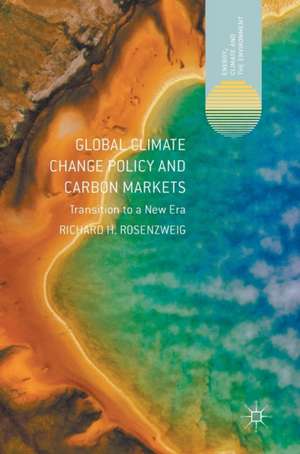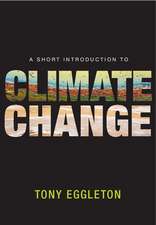Global Climate Change Policy and Carbon Markets: Transition to a New Era: Energy, Climate and the Environment
Autor Richard H. Rosenzweigen Limba Engleză Hardback – 27 sep 2016
In this book, Richard Rosenzweig, describes the policies proposed and adopted in the first generation of climate change policy-making including the Kyoto Protocol and the carbon markets and assesses their failure to halt the increases of rising emissions of greenhouse gases. Carefully structured throughout, each chapter demonstrate how the first generation of policies failed because they were top down, overly ambitious and complex. The author uses the lessons drawn from this analysis to recommend more modest, targeted policies, arguing that they will be more successful in fighting climate change in the new era of policy-making.
An invaluable reference for advanced undergraduate and graduate students in taking relevant courses in Environmental Policy, Law and Business. This book will also be a useful overview for researchers working in the field as well as those working in government and policy.
| Toate formatele și edițiile | Preț | Express |
|---|---|---|
| Paperback (1) | 583.78 lei 43-57 zile | |
| Palgrave Macmillan UK – 13 noi 2020 | 583.78 lei 43-57 zile | |
| Hardback (1) | 730.35 lei 43-57 zile | |
| Palgrave Macmillan UK – 27 sep 2016 | 730.35 lei 43-57 zile |
Din seria Energy, Climate and the Environment
- 9%
 Preț: 626.55 lei
Preț: 626.55 lei - 20%
 Preț: 629.40 lei
Preț: 629.40 lei - 8%
 Preț: 610.62 lei
Preț: 610.62 lei - 15%
 Preț: 636.63 lei
Preț: 636.63 lei -
 Preț: 391.61 lei
Preț: 391.61 lei - 15%
 Preț: 651.51 lei
Preț: 651.51 lei - 15%
 Preț: 644.18 lei
Preț: 644.18 lei -
 Preț: 394.51 lei
Preț: 394.51 lei -
 Preț: 389.70 lei
Preț: 389.70 lei - 15%
 Preț: 644.18 lei
Preț: 644.18 lei - 15%
 Preț: 640.06 lei
Preț: 640.06 lei -
 Preț: 392.60 lei
Preț: 392.60 lei -
 Preț: 389.70 lei
Preț: 389.70 lei - 15%
 Preț: 642.51 lei
Preț: 642.51 lei -
 Preț: 387.75 lei
Preț: 387.75 lei - 15%
 Preț: 641.85 lei
Preț: 641.85 lei - 18%
 Preț: 993.43 lei
Preț: 993.43 lei -
 Preț: 389.70 lei
Preț: 389.70 lei - 15%
 Preț: 644.18 lei
Preț: 644.18 lei - 15%
 Preț: 640.06 lei
Preț: 640.06 lei - 15%
 Preț: 646.11 lei
Preț: 646.11 lei -
 Preț: 390.63 lei
Preț: 390.63 lei - 18%
 Preț: 951.29 lei
Preț: 951.29 lei - 15%
 Preț: 635.15 lei
Preț: 635.15 lei - 15%
 Preț: 641.03 lei
Preț: 641.03 lei - 15%
 Preț: 632.01 lei
Preț: 632.01 lei -
 Preț: 389.70 lei
Preț: 389.70 lei - 15%
 Preț: 641.71 lei
Preț: 641.71 lei -
 Preț: 386.22 lei
Preț: 386.22 lei - 15%
 Preț: 644.95 lei
Preț: 644.95 lei -
 Preț: 391.61 lei
Preț: 391.61 lei - 18%
 Preț: 729.06 lei
Preț: 729.06 lei - 15%
 Preț: 643.99 lei
Preț: 643.99 lei
Preț: 730.35 lei
Preț vechi: 890.66 lei
-18% Nou
Puncte Express: 1096
Preț estimativ în valută:
139.80€ • 151.90$ • 117.51£
139.80€ • 151.90$ • 117.51£
Carte tipărită la comandă
Livrare economică 21 aprilie-05 mai
Preluare comenzi: 021 569.72.76
Specificații
ISBN-13: 9781137560506
ISBN-10: 1137560509
Pagini: 320
Ilustrații: XIX, 322 p.
Dimensiuni: 148 x 210 x 25 mm
Greutate: 0.52 kg
Ediția:1st ed. 2016
Editura: Palgrave Macmillan UK
Colecția Palgrave Macmillan
Seria Energy, Climate and the Environment
Locul publicării:London, United Kingdom
ISBN-10: 1137560509
Pagini: 320
Ilustrații: XIX, 322 p.
Dimensiuni: 148 x 210 x 25 mm
Greutate: 0.52 kg
Ediția:1st ed. 2016
Editura: Palgrave Macmillan UK
Colecția Palgrave Macmillan
Seria Energy, Climate and the Environment
Locul publicării:London, United Kingdom
Cuprins
- Chapter 1 Introduction.- Chapter 2 Climate Change Policies Of The Clinton Administration.- Chapter 3 The US Says No While The Carbon Market Moves Forward.- Chapter 4 The End Of Climate Change 1.0 Internationally.- Chapter 5 The End Of Climate Change 1.0 In The US.- Chapter 6 US And International Climate Change 2.0 Emerges.- Chapter 7 Recommendations.
Notă biografică
Richard Rosenzweig has extensive experience in climate change policy and carbon markets. In Government, Mr. Rosenzweig participated in the formulation of climate policy as U.S. Department of Energy Chief of Staff from 1993-1996. In business, he served as Chief Operating Officer of Natsource, the world’s largest buyer of carbon credits through 2007 according to independent research.
Textul de pe ultima copertă
In this book, Richard Rosenzweig, describes the policies proposed and adopted in the first generation of climate change policy-making including the Kyoto Protocol and the carbon markets and assesses their failure to halt the increases of rising emissions of greenhouse gases. Carefully structured throughout, each chapter demonstrate how the first generation of policies failed because they were top down, overly ambitious and complex. The author uses the lessons drawn from this analysis to recommend more modest, targeted policies, arguing that they will be more successful in fighting climate change in the new era of policy-making.
An invaluable reference for advanced undergraduate and graduate students in taking relevant courses in Environmental Policy, Law and Business. This book will also be a useful overview for researchers working in the field as well as those working in government and policy.
Richard Rosenzweig has extensive experience in climate change policy and carbon markets. In Government, Mr. Rosenzweig participated in the formulation of climate policy as U.S. Department of Energy Chief of Staff from 1993-1996. In business, he served as Chief Operating Officer of Natsource, the world’s largest buyer of carbon credits through 2007 according to independent research.
Caracteristici
Provides a practitioner’s perspective of the failure of climate change policies to slow global greenhouse gas emissions and the performance of carbon markets Explores the practical and the political reasons for the failure of climate change policies Offers recommendations for future US and international policy around the role of technology, regulation and markets












